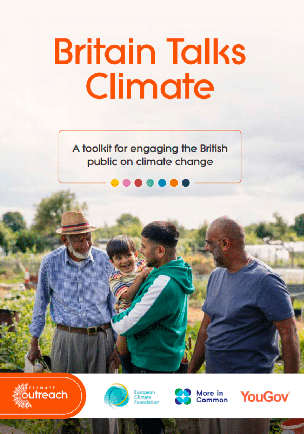SECA held a Knowledge Sharing session on 28 March with Ben McCallan of Zero Carbon Guildford who talked about Britain Talks Climate’s techniques for getting the climate message across to different audiences
Ben McCallan of Zero Carbon Guildford introduced Britain Talks Climate, an evidence-based, shared resource that can be used to anchor climate campaigning and communications in a deeper understanding of the British public’s core values and beliefs. It offers a strategic understanding of the British audience and – against a backdrop of growing concern about polarisation – identifies ways to engage across the whole of society.
Britain Talks Climate groups the population into seven different segments, not just the familiar Left Wing/Right Wing binary, and looks at how best to engage with each group. Ben observed that a lot of our familiar climate messaging may only land with those within the “climate bubble” who are already converted, while alienating those it’s trying to reach. Focusing on the impact of climate change on nature and wildlife, or on concerns for our children’s future, is more of a unifying opening message for a conversation than, say, emphasising climate justice and the greater impact on the Global South.

The seven segments identified by Britain Talks Climate are:
- Progressive Activists – Vocal and passionate, politically active but pessimistic about the direction society has taken. Climate change is central to their identity and politics.
- Backbone Conservatives – Conservative, patriotic and optimistic, they take pride in success stories about British environmental achievements and care deeply about food, farming, and the rural economy. More sceptical about grand claims of global leadership, or “virtue signalling”.
- Civic Pragmatists – Moderate, tolerant, and anxious about the future. They try to follow a low-carbon lifestyle, but feel demotivated by lack of political ambition. Likely to look past politics and support progressive climate policies.
- Established Liberals – Confident and comfortable, with a global outlook driven more by professional networks than a sense of solidarity with other communities. Don’t necessarily view climate change as something that will affect them personally, but do want to hear how low-carbon solutions will drive economic resilience and growth.
- Disengaged Battlers – Feel unheard and unrepresented but are nevertheless broadly convinced of the need for action on climate change. Do not yet believe the transition will benefit them and are too busy surviving from day to day to give it more attention.
- Disengaged Traditionalists – Disillusioned and sceptical, they recognise tangible risks like air pollution, but are far from convinced by the need for climate action. More likely to see it as a problem for foreign governments to deal with.
- Loyal Nationals – Traditional and proud to be British, concerned about issues such as crime, immigration, and terrorism. Believe the UK is already living with climate change but see it as an issue linked to localised (rather than global) inequality and environmental degradation. Their political participation is driven by outrage about a system that supports corporate greed over working people.
Ben outlined how the approach had worked for Zero Carbon Guildford in its community engagement. Giving the example of traffic in Guildford, he said framing the climate emergency as not just an environmental issue but also a health, economic and social crisis can be effective in engaging a wider audience with a range of different concerns and motivations. “If I start a conversation talking about traffic with all of these factors, I can tie in not just emissions, but economy, health, the social factor, it means I’m much less likely to lose people right at the off than if I just say ‘get out of your car because we need to tackle climate change’,” he said.
Ben gave many examples of how to frame the climate conversation to appeal to different groups and we won’t attempt to summarise the whole session, but you can watch the video recording on our YouTube channel here, and his hugely informative slides are here.
And there’s lots more information on Britain Talks Climate on the website, including downloadable resources here.

